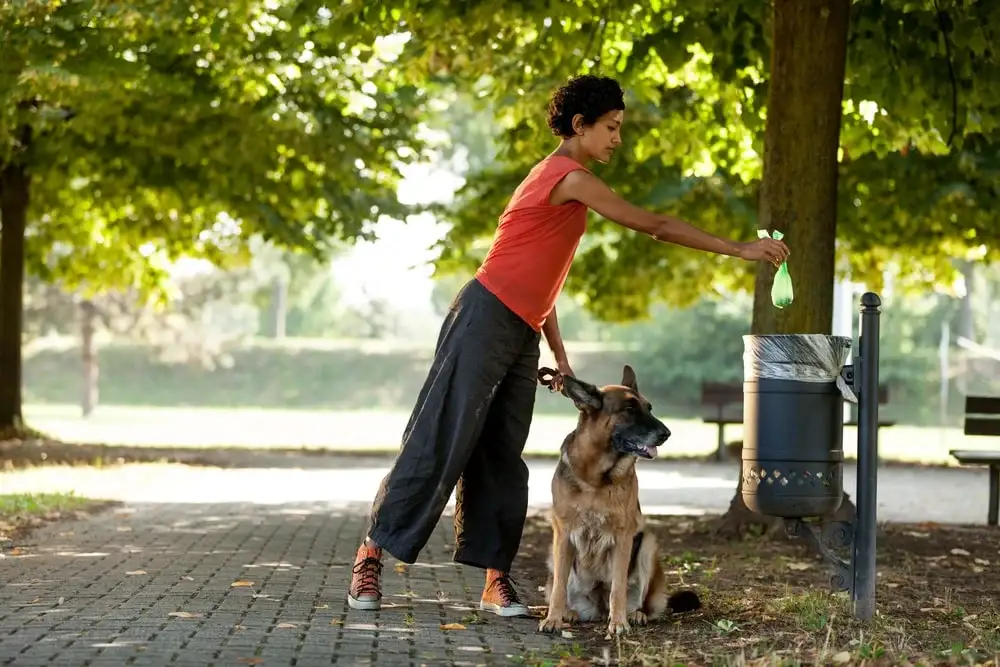PET HEALTH
One of the less glamorous parts of pet care can be checking your dog’s poop to make sure they’re healthy. In doing so, you may be able to catch when something isn’t quite right on the inside — like finding blood in your dog’s stool.
There are many reasons blood can show up in your dog’s poop, with some more serious than others. It can be helpful to know what to do when this happens, so let’s learn what might be causing bloody stool, what to do if you notice it, and how it can be treated.
Types of Blood in a Dog’s Stool
Finding blood in your dog’s stool can be scary because your dog can’t exactly tell you when something might be wrong. The blood can also show up in different colors, forms, and quantities. Knowing what it looks like can help you and your vet figure out what part of the digestive tract the blood is coming from and give you an idea of where the problem may be originating.
Hematochezia: Bright red blood
When your dog has bright red blood in their stool it can be an indication that there’s an issue in the lower digestive tract or the colon.1 You may notice this kind of blood on the surface of fully formed or soft stools, or it may present as bloody diarrhea. On formed stools, you may also notice mucus covering it.2 With hematochezia, your dog may have a larger volume of stool or defecate more often.
In some cases, your dog may poop what looks like pure blood if their digestive tract is empty or the poop is completely liquid.2
Melena: Dark, tarry stool
When your dog has dark, tarry, sticky or jelly-like stools it can be an indication that blood has been swallowed or digested and there may be a problem in the upper digestive tract or elsewhere in the body.1 It may be a little harder to tell if there’s melena blood in the stool if your dog’s stool is already darker in color. In this case, you can wipe the stool with a paper towel to check for the presence of a darker reddish color. With melena, your dog’s stool can typically look more solid than with hematochezia.2
Causes of Blood in Dog Stool
There are a number of reasons why your dog may have bloody stool. The color and appearance can indicate what’s causing blood in a dog’s stool, but your veterinarian will likely run a number of tests to reach a diagnosis. Here are some of the causes associated with hematochezia and melena.
Causes associated with hematochezia
- Intestinal parasites (like worms)
- Parvovirus
- Intestinal blockages
- Internal Trauma
- Tumors
- Anal gland issues
- Colitis (colon inflammation)
- Hemorrhagic gastroenteritis
Causes associated with melena
- Ingesting blood or toxins
- Blood clotting disorders
- Tumors or ulcers
- Parasites
- Inflammatory disorders
- Internal trauma or foreign bodies
- Kidney failure or liver disease
- Pancreatitis
- Reaction to certain medications like anti-inflammatories
- Infections
What To Do if Your Dog’s Stool Is Bloody
Since there are a number of different causes of bloody dog stool, it’s recommended that you call your vet when you notice it. To determine the best course of action, your vet may ask you some questions regarding:
- The stool’s color
- The stool’s appearance (formed or soft, diarrhea)
- How much blood is present in the stool
- The amount of stool
- How many times your dog defecated bloody stool
- Other symptoms present (like vomiting, weakness, or blood in their urine)
Is finding bloody dog stool an emergency?
Blood in your dog’s stool can indicate a serious problem that could be life-threatening, especially if they’re showing other symptoms like vomiting, lethargy, loss of appetite, or difficulty breathing. Sometimes, it may not be as serious of a problem if there’s blood in your dog’s stool but they’re acting normal. This is why calling your vet when you notice bloody stool can be a good idea to figure out if it’s an emergency situation.
Treatment for Bloody Stool in Dogs
When you call your veterinarian, they’ll be able to tell you if you should bring your pup in to be examined or if you can keep them at home to monitor. If you bring your dog to the vet, they’ll likely run a number of diagnostic tests — which could include X-rays, fecal tests, ultrasounds, and bloodwork — to diagnose the problem.
Treatment for blood in dog stool will depend on what the cause is. That means the road to recovery and the cost of treatment can vary as well. Depending on the cause, treatment could include diet changes, medication, hospitalization, fluids to combat dehydration, anti-parasite treatment, surgery, or diarrhea treatment.1
Home remedies for bloody dog stool
If your vet decides that you can continue to monitor your dog’s condition at home, follow any at-home care tips they provide to help your dog feel better. These could include keeping them hydrated, relieving diarrhea or an upset stomach, letting them rest, or giving them bland food for a little while. If you notice any negative changes in your dog’s stool, contact your vet to see what should be done.
Pet Insurance May Help With Vet Costs
Blood in your dog’s stool can be scary, but the vet bills associated with the cost of getting your pup better don’t have to be. Award-winning3 MetLife Pet offers dog insurance policies that can help cover the cost of things like X-rays, ultrasounds, vet-prescribed medications, and surgeries.4 See how we can help you by getting a quick quote today.


